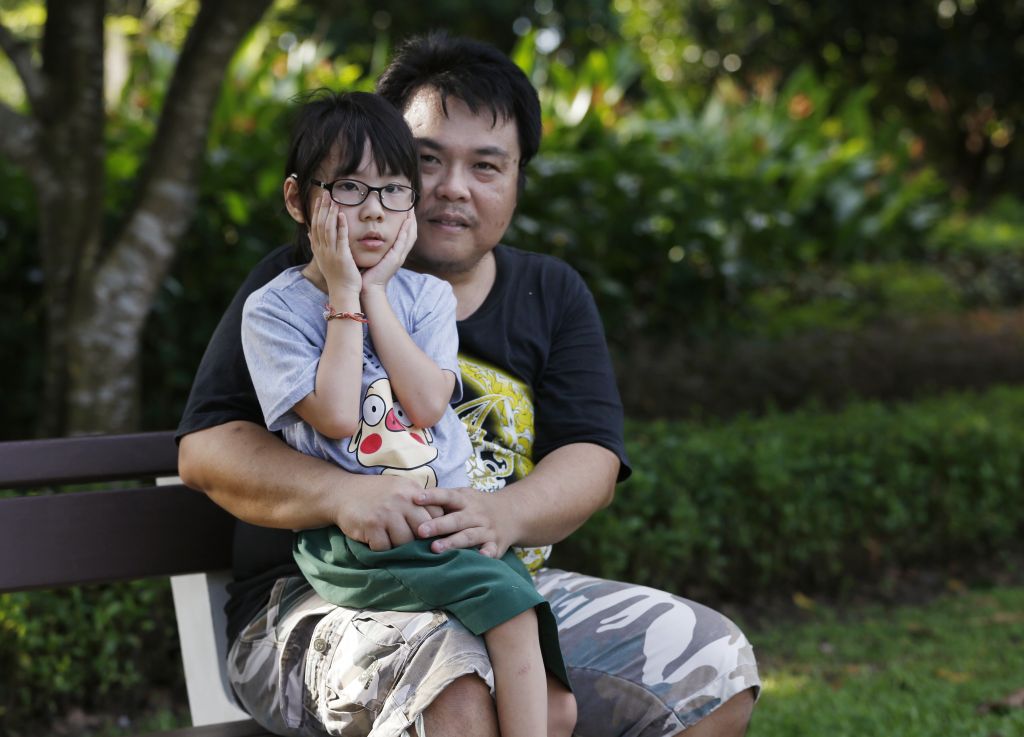
SINGAPORE — Consumed with worries about his daughter’s future, Mr Lee Shang Lian has not had a proper night’s rest for two to three years.
His wife died of nose cancer five years ago and their only child Qi Zhen suffers from global development delay, a condition that results in limited cognitive abilities and mobility.
The seven-year-old has poor social skills, communication difficulties and sometimes aggressive behaviour. She also has a convergent squint — an eye condition which causes her eyes to turn inwards — and amblyopia, also known as lazy eye, in both eyes.
Qi Zhen’s condition means she is highly dependent on her caregivers for all her needs. She cannot balance or walk on her own, feed herself or go to the toilet.
Most difficult of all, she cannot even express her needs verbally — she can only cry to indicate pain, discomfort or unhappiness.
The Rainbow Centre student is one of seven individuals supported by the TODAY Enable Fund, set up last December to support efforts aimed at enhancing the education, skills, and employment prospects of people with disabilities, as well as fostering greater empathy and inclusion for them in the community.
Mr Lee, whose social worker helped him apply for assistance, received a one-off sum of S$2,000 from the TODAY Enable Fund for Qi Zhen’s education and living expenses about a month ago.
The 39-year-old, who is currently unemployed, said: “If my daughter meets any problem, this sum of money will come in very useful.”
The Lees’ troubles started in 2010. About a month and a half after Qi Zhen was born, Mrs Lee was diagnosed with terminal stage nose cancer.
But she took care of her daughter for over a year, until her illness made it impossible. She died in 2012, when Qi Zhen was two weeks shy of turning two.
The little girl was then left under the care of her maternal grandmother in Ipoh, Malaysia, while Mr Lee continued working as a store assistant-cum-delivery driver in Singapore. He would take an eight-hour bus ride every fortnight just to visit her.
This arrangement lasted for close to two years until conflicts arose when her grandmother would not accept that Qi Zhen, who was significantly slower in hitting her milestones, was different from other kids.
In fact, Qi Zhen’s conditions were not diagnosed until she had difficulty standing at age two, when her peers were already walking independently.
After that, Mr Lee’s cousin helped to care for her until her own family commitments made it impossible to continue two years ago.
Mr Lee had to quit his job to take care of Qi Zhen full time. As he has no income, he and his daughter have been living a hand-to-mouth existence for the past two years, surviving on the S$600 to S$700 monthly assistance they receive from various funds and welfare organisations.
But financial woes are not the greatest of Mr Lee’s troubles.
He is now plagued by worries about her future.
He goes to bed with Qi Zhen at about 9.30pm every night, but he stays awake till about 2am. “I lie in bed but my eyes are wide open … I can’t sleep,” he said.
“Every night I think: When I’m no longer around, what will happen to her? Will she be independent? Will she able to enter the workforce? What will happen to her? What problems will she face? She still doesn’t know how to be independent.
“She is a special needs child and even if she manages to find a job in future, I don’t know if she will be able to adapt,” he said. “I don’t know what the future holds for her. I’m really worried.”
His only hope is to employ a domestic helper to look after Qi Zhen while he works — possibly as an Uber or Grab driver — so he can start earning an income and set aside a nest egg for her future.